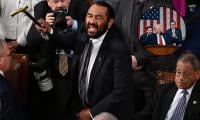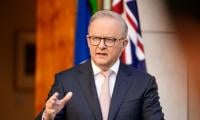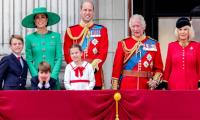Govt issues policy statement on Operation Azm-e-Istehkam after criticism: No large-scale military action, no displacements: PM office
PMO says no large-scale military operation being contemplated where displacement of population to be required
ISLAMABAD: After severe reaction from various opposition and political parties on announcement of ‘Azm-e-Istehkam’ operation, the Prime Minister’s office made it clear on Monday night that no large-scale military operation was being contemplated where displacement of population would be required.
“The recently announced vision for enduring stability named Azm-e-Istehkam is being erroneously misunderstood and compared with earlier launched kinetic operations like Zarb-e-Azab, Rah-e-Najaat, etc.,” the statement observed.
The previous operations were conducted to physically dislodge terrorists from their known locations, which had become no-go areas and compromised the writ of the state. These operations required mass displacement of the local population and systematic clearance of affected areas.
The statement said there were no such no-go areas in the country since the ability of terrorist entities to carry out large-scale organised operations inside Pakistan was decisively degraded by earlier operations.
It maintained that ‘Azm-e-Istehkam’ is a multi-domain, multi-agency, whole-of-the-system national vision for enduring stability in Pakistan.
“It is meant to reinvigorate and re-energise the ongoing implementation of revised National Action Plan, which was initiated after the national consensus across the political spectrum,” the statement concluded.
Earlier, various political parties including the PTI supported Sunni Ittehad Council (SIC), Jamiat Ulema-e-Islam Fazl (JUIF), Jamaat-e-Islami (JI), Awami National Party (ANP), Qaumi Watan Party (QWP) had expressed their reservations on proposed Azm-e-Istehkam operation.
Khyber-Pakhtunkhwa Chief Minister Ali Amin Gandapur told the media on Monday that discussions were held for improving law and order under ‘Azm-e-Istehkam’ initiative at the meeting of central apex committee on National Action Plan (NAP), but there was no mention of any operation.
Talking to reporters outside Adiala Jail, he shed light on various political and security concerns, including the government’s decision to launch the Azm-e-Istehkam operation. He expressed his willingness to meet the army chief and the ISI DG to discuss ongoing issues and clarify the scope of any planned operations.
The KP CM warned of a strong reaction if their demands were not met, highlighting the need for clear communication and mutual understanding. He highlighted improvements in law and order under his administration, crediting the strengthening of law-enforcement agencies, including the Counter Terrorism Department (CTD).
Gandapur discussed General Faiz’s three-year engagement with Afghanistan during the PTI government, and criticised General Bajwa for removing him (Faiz) despite acknowledging his potential as an outstanding army chief in his earlier talks. He alleged a conspiracy involving America or Nawaz Sharif to weaken the PTI by removing General Faiz.
Emphasising the need for dialogue, the KP CM criticised Bilawal Bhutto for not visiting Afghanistan despite his international tours. He stressed the importance of engaging in discussions with Afghanistan to resolve ongoing issues.
He also touched on the ISPR (Inter-Services Public Relations) policy regarding operations, saying that he would discuss further actions once the policy was clearly defined. He underscored the necessity of involving the public and provinces in these decisions to ensure transparency and trust.
About economic and security challenges, Gandapur spoke about the efforts to combat terrorism and improve economy. He mentioned Imran Khan’s consistent call for negotiations, lamenting the lack of talks with institutions or the federal government. He also highlighted KP’s role as an electricity-generating province, pointing out load-shedding issues caused by other factors.
Gandapur announced his plans to provide jobs to 100,000 people, increase revenue from Rs20 billion to Rs50 billion, and raise salaries of government employees by 25pc. He also emphasised focus on education.
Earlier, he met PTI founder Imran Khan in Adiala Jail and discussed various issues and sought guidance and party policy regarding political and administrative matters, according to the jail sources. Gandapur spent around two hours with Imran Khan.
Meanwhile, JUIF Chief Maulana Fazlur Rehman termed the newly announced anti-terrorism operation, Azm-e-Istehkam, an ‘instability operation’, which would further weaken the country.
Addressing a press conference in Quetta on Monday, Fazl said the state had almost no writ in the country. “Our history is about fighting against slavery. Did we achieve Pakistan to be the slaves of generals?” he asked. Fazl, the former federal minister, said that armed militant groups were openly controlling areas in Khyber-Pakhtunkhwa and Balochistan.
“They [federal government] have announced the operation Azm-e-Istehkam. It is rather an “Adm Istehkam” [destabilising] operation, which would further weaken the country,” he added. The veteran politician asked why the country was being undermined. “Decisions would be made by uniformed individuals wherever they are present,” the JUIF chief said in a veiled jibe at Saturday’s meeting of the central apex committee on the National Action Plan (NAP).
Continuing his criticism of the government, Fazl, who was the chief of PMLN and JUIF’s former alliance with other political parties — the Pakistan Democratic Movement — said that “Shehbaz Sharif is not the premier, he is only sitting on the throne”. The seasoned politician went on to say that “allying is good but it should be under a mutual understanding”, as he referred to the potential coalition between the JUIF and the Imran Khan-founded PTI, following their consensus on playing the role of a united opposition in the National Assembly and constituting a political committee to address various issues between them and formulate a political strategy.
“We are not opposing any alliance as the process of political actors’ consultations should continue,” he added. Separately, Jamaat-e-Islami (JI) Emir Hafiz Naeemur Rehman expressed surprise over announcement of ‘Azm-e-Istehkam’ operation at the apex committee meeting without consulting the parliament and political leadership.
In a statement issued from Mansoorah on Monday, he emphasised that people of Pakistan, especially those living in Khyber-Pakhtunkhwa and Balochistan, could no longer afford military operations. The country, he argued, needed political stability rather than military interventions, highlighting the failure of past operations to achieve the desired results. Hafiz Naeem stressed the need for establishing peace, ending terrorism and stopping foreign interference.
He asserted that these objectives could only be met through formation of a government with a genuine public mandate. Additionally, he added, it was a collective responsibility of the Pakistani people to protect people and investors from China and other friendly countries working on development projects in Pakistan. He called for unified efforts to create an investor-friendly and peaceful environment in the country.
Naeem criticised the military operations initiated under General (retd) Pervez Musharraf, stating that they only created a gulf between people and security agencies, leading to increased instability and significant civilian and security personnel casualties. He maintained that any further operations would not succeed without consultations with people. He affirmed that Jamaat-e-Islami wanted peace and eradication of all forms of religious, political and social terrorism. He suggested that an agreement could be reached for operations targeting specific terrorist threats.
To combat terrorism effectively, the JI emir emphasised the necessity of activating and enhancing work of intelligence agencies and the police, as well as strengthening the judicial system. He pointed out that the region was paying the price for the so-called war on terror, led by the US for its own interests. He called for Pakistan and its friendly countries to establish peace in the region through dialogue.
Meanwhile, Awami National Party (ANP) Provincial President Mian Iftikhar Hussain said his party had serious reservations over Operation Azm-e-Istehkam, as it should be discussed and approved by the parliament instead of the apex committee.
He was talking to the media persons during the visit of KP Governor Faisal Karim Kundi to Bacha Khan Markaz in Peshawar on Monday. He said the Parliament, including the National Assembly, Senate and all provincial assemblies, must be taken into confidence while taking such decisions against terrorism and extremism.
“The public is fed up with the military operations and dialogue with militants as in both cases, local people are the ultimate sufferers and they have to leave their own homes and towns,” he added.
The ANP leader said that militants had occupied the areas whenever local people left their homes. The ANP leader said the military operation must be started from Punjab where the masterminds of terrorists and extremist organisations were based.
Mian Iftikhar said the federal government must expose those who had brought and facilitated the alleged militants from the neighbouring country and resettled them on Pakhtun soil during the PTI-led government. “The PTI is playing a double game on the elimination of terrorism in the country. On the one hand, the Khyber Pakhtunkhwa chief minister had not objected to Operation Azm-e-Istehkam at apex committee, and on the other the PTI MNAs in National Assembly were making hue and cry over the proposed operation,” he said. The ANP leader said the PTI leadership and elected members were only interested in the release of their party founding chairman.
Mian Iftikhar said power load-shedding had increased in parts of KP after the chief minister forcibly entered a grid station and staged the “button drama” to befool the public.
The ANP leader asked the KP chief minister and governor to end personal differences and push the province in the right direction including getting provincial rights from the federal government.
Also, Qaumi Watan Party (QWP) Provincial Chairman Sikandar Hayat Khan Sherpao Monday said leaders of political parties in general and the ones belonging to KP in particular should have been invited to the meeting of the apex committee to take them into confidence before launch of the Operation Azm-e-Istehkam.
Speaking at a press conference at Sherpao village in Charsadda, he said without taking all stakeholders into confidence, it would be difficult to achieve 100 per cent results from the military operation.
Sikandar Sherpao said the political parties had been taken into confidence before launching Operation Zarb-e-Azb in the past. He said it should be investigated whether or not the National Action Plan was implemented in letter and spirit. He questioned as to who facilitated militants to regroup after the operation Zarb-e-Azb.
Commenting on the federal budget, he said the GDP growth rate of 3.6pc would be difficult to achieve during the next financial year as the 2.2pc growth rate for the current year was achieved with a lot of difficulty.
The QWP leader said the KP people were facing the worst kind of power loadshedding, though the province produced surplus electricity. He rejected the impression that KP recorded the highest line losses in the country.
Meanwhile, Defence Minister Khawaja Muhammad Asif said five to six thousand TTP terrorists were brought to Pakistan during the PTI government, they were given shelter and amnesty and settled in Pakistan.
Talking to Geo News, he said the army conducts an operation to get rid of terrorists, but the civilian government of the area did not fulfil its responsibility. He said the TTP and BLA were the leading sources of terrorism. He said General Bajwa and General Faiz had settled the matters with the TTP people, but the opposition of that time comprising PMLN were given only a short briefing on the issue. “We were given an impression that everything was fine in Swat,” he said and added that politicians had raised questions, mostly by Ali Wazir and Mohsin Dawar, but they were not allowed to speak.
He said the war that General Zia and General Musharraf fought was to prolong their rule only. He regretted that General Zia destroyed religion, social structure and society. Talking to another TV channel, Khawaja Asif the operation is against the PTI, as it is against those who have waged a war against the country.
-
 Prince William Plans For Monarchy Revealed As He Gears Up For ‘big Changes’
Prince William Plans For Monarchy Revealed As He Gears Up For ‘big Changes’ -
 Rep. Al Green Removed From House Chamber During Trump’s State Of Union Address: Here’s What Happened
Rep. Al Green Removed From House Chamber During Trump’s State Of Union Address: Here’s What Happened -
 Bill Gates Breaks Silence On Epstein Links, ‘took Responsibility For His Actions’ During Town Hall Meeting
Bill Gates Breaks Silence On Epstein Links, ‘took Responsibility For His Actions’ During Town Hall Meeting -
 Christina Applegate Struggles To Leave Bed Amid Multiple Sclerosis Battle
Christina Applegate Struggles To Leave Bed Amid Multiple Sclerosis Battle -
 Matthew McConaughey, Timothée Chalamet Predict AI Actors May Compete At Oscars By 2028
Matthew McConaughey, Timothée Chalamet Predict AI Actors May Compete At Oscars By 2028 -
 Princess Eugenie Appears Unfazed By Andrew Drama In First Outing Since His Arrest
Princess Eugenie Appears Unfazed By Andrew Drama In First Outing Since His Arrest -
 Gucci Faces Backlash For Using AI In New Spring Collection
Gucci Faces Backlash For Using AI In New Spring Collection -
 Prince Harry, Meghan Markle Announce New Humanitarian Trip To Jordan
Prince Harry, Meghan Markle Announce New Humanitarian Trip To Jordan -
 Prince Harry Is In All Out War With Meghan For Lilibet: It’s More Than The Sussexes Could Ever Generate’
Prince Harry Is In All Out War With Meghan For Lilibet: It’s More Than The Sussexes Could Ever Generate’ -
 President Donald Trump Delivers The Traditional State Of The Union Address To Congress
President Donald Trump Delivers The Traditional State Of The Union Address To Congress -
 Kyle Connor Focuses On Jets' NHL Season After Skipping Trump's White House Invite
Kyle Connor Focuses On Jets' NHL Season After Skipping Trump's White House Invite -
 Why Prince William Grew Concerned About Meghan Markle's Conduct Shortly After Her Royal Wedding With Harry?
Why Prince William Grew Concerned About Meghan Markle's Conduct Shortly After Her Royal Wedding With Harry? -
 Trent Williams Future With San Francisco 49ers Uncertain Ahead Of NFL Season
Trent Williams Future With San Francisco 49ers Uncertain Ahead Of NFL Season -
 Australia: Bomb Threat Behind Evacuation Of PM Anthony Albanese Linked To Chinese Dance Group
Australia: Bomb Threat Behind Evacuation Of PM Anthony Albanese Linked To Chinese Dance Group -
 Rachel Reid Delays Release Of 'Heated Rivalry' Sequel 'Unrivaled' Due To Health Struggles
Rachel Reid Delays Release Of 'Heated Rivalry' Sequel 'Unrivaled' Due To Health Struggles -
 British Royals ‘not Appreciated’ In Modern World, Says Author
British Royals ‘not Appreciated’ In Modern World, Says Author




